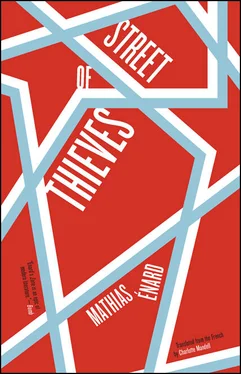Seventeen. That’s a huge little number. You don’t realize, when you listen to the radio or the TV, the number of corpses left by some catastrophe or other, what seventeen bodies represent. You say, oh, seventeen, that’s not so much, tell me about a thousand, two thousand, three thousand stiffs, but seventeen, seventeen isn’t anything extraordinary, and yet, and yet, it’s an enormous quantity of vanished life, dead meat, it’s cumbersome, in memory as well as in the cold-storage room, it’s seventeen faces and over a ton of flesh and bone, tens of thousands of hours of existence, billions of memories gone, hundreds of people touched by mourning, between Tangier and Mombasa.
One by one, I wrapped these guys up in their shrouds, and wept; most of them were young, my age, or even younger; some had broken limbs or bruises on their face. The great majority looked Arab. Among these bodies was a girl’s. She had tattooed a telephone number in henna on her arm, a Moroccan number. She had long hair, very black, a gray face. I was disturbed; I didn’t want to see her breasts, her sex; normally I shouldn’t have placed her in the casket myself, a woman was supposed to do that. I was afraid of my own gaze on this female body; I imagined Meryem dead — it was her I was placing in the coffin, her I was burying finally, alone in the night of my nightmares, I imagined the police calling this tattooed phone number, a mother or brother picking up, an almost mechanical voice informing them, repeating very loudly to be understood, of the end of their sister, their daughter, just as the phone must have rung at my uncle’s house, one day, to announce this terrible news, just as it will ring one day for us, too, one after the other, and shyly, tenderly, fraternally, I placed this unknown girl in her metal sarcophagus.
Perhaps we can’t really picture death unless we see our own corpse in others’ bodies, young as me, Moroccan as me, candidates for exile like me.
At night I would write poems for all these dead people, secret poems that I would then slip into their coffins, a little note that would disappear with them, a homage, a ritha ’; I gave them names, tried to imagine them alive, to guess their lives, their hopes, their last moments. Sometimes I saw them in my dreams.
I never forgot their faces.
My hatred for Cruz grew; it was irrational; aside from my semi-captivity, he wasn’t mean; he was crumbling beneath the weight of the corpses; he just had this strange perversion that consisted in looking at, scrutinizing all day, extraordinarily violent videos; beheadings in Afghanistan, hangings from the Second World War, all kinds of car accidents, bodies incinerated by a bomb.
I had to get away as soon as possible.
I missed Casanova and my soldiers every day. I thought of Judit, sometimes I sent her texts and called her; most of the time she didn’t reply to the messages or pick up the phone, and I felt as if I were in limbo, in the barzakh, unreachable between life and the beyond.
For books, all I had was the Koran and two Spanish thrillers bought used in town, not great, but OK, they helped pass the time. Then I had three days of vacation because Cruz left to deliver a load of corpses on the other side of the Strait. He couldn’t leave me locked up the whole time, so he gave me a little pocket money (until then I hadn’t yet seen the color of my wages) to amuse myself in town, as he said. I spent my days at sidewalk cafés, quietly reading and drinking my small beer.
I went to check my email and there, surprise: a message from Sheikh Nureddin. He was writing to me from Arabia, where he was working for a pious foundation; he asked me for news. I replied saying I was in Spain, without telling him about my pitiful activity. I hesitated about telling him about the fire at the Propagation for Koranic Thought, I wondered if he knew about it. His letter was kind, even brotherly; my suspicions about his possible participation in the Marrakesh attack seemed ridiculous to me now, even if the mystery of his sudden disappearance remained intact — I asked him if he knew where Bassam was.
I thought nostalgically about the long reading sessions at the Group, lying on the rugs. Tangier was far away, in another world.
I wrote a long note to Judit explaining in brief my slave’s life in Algeciras; I didn’t mention the corpses, just the gardening, cleaning, and the strange Cruz. I told her I hoped to see her soon.
I called Saadi, inviting him for coffee in downtown Algeciras; he had a visa, he could come and go as he liked, that was the injustice of the administration: the older you were and the less you wanted to, the easier it was to move around.
He was happy to see me again, as was I. I asked him if there was news of the company — he told me the Moroccan government was going to find a solution any day now. I still had time to profit from it, he said.
I hesitated. That was one way to leave Cruz; it would also mean saying goodbye to Judit. I was sure that if I returned to Tangier it would be almost impossible for me to return to Spain.
If Saadi guessed the reason for my hesitation, he didn’t insist.
I told him about my days with Cruz, the great sadness of this terrible job, he listened, opening his eyes wide and shaking his gray head; well son, he said, if I had known, I wouldn’t have sent you into that cesspit — I tried to reassure him, without much conviction, telling him it would allow me to make a little money to go to Barcelona in a month or two.
We stayed there till evening, sitting in the same café, taking advantage of the breeze, of the slow swaying of the palm trees that shed a little shadow on the square. And then he left. He hugged me and said, sure you don’t want to come back with me on the boat? It’s not easy for me sending you back there.
I hesitated for a second, it was tempting to stay with him, to rediscover the floating cage of the Ibn Battuta, where nothing could happen to you, aside from inadvertently crushing a cockroach with your bare feet.
Finally I refused; I promised to call him very soon, and after a final embrace I left to catch my bus.
I also took advantage of my boss’s absence to sketch out a plan. I knew he kept — at least when he was there — a certain sum of money in a little safe, so he could pay people without a middleman, that this safe had a key, and that he kept it on his key ring.
The idea of stealing it came to me from the thriller I was reading, from all the thrillers I had read; after all, wasn’t I locked up in a novel, a very noir one? It was only logical that it was these books that suggested a way out.
IBNBattuta recounts in his travels how, during his visit to Mecca, he meets a strange character, a mute whom the Meccans all know and call Hassan the Mad, who was touched with madness under strange circumstances: when he was still of sound mind, Hassan was completing his ritual circumambulations around the Kaaba at night and, every evening, he’d pass a beggar in the sanctuary — they never saw each other during the day, only at night. One night, then, the beggar addressed Hassan: Hey, Hassan, your mother misses you and is crying, wouldn’t you like to see her again? My mother? Of course, Hassan replied, whose heart had sunk at the memory of her, of course, but it’s not possible, she’s far away. One day the beggar offered to meet him at the cemetery, and Hassan the Mad agreed; the beggar asked him to hold onto the beggar’s robes and close his eyes, and when he opened them again, Hassan was in front of his house, in Iraq. He spent two weeks with his mother. Two weeks later, he met the beggar at the village cemetery; the beggar offered to bring him back to Mecca, to Hassam’s master Najm Ed-Din Isfahani, by the same means, his eyes closed, his hands clutching the beggar’s linsey-woolsey robe. He made Hassan promise never to reveal anything about this journey. In Mecca, Isfahani was worried about the long absence of his servant, two weeks isn’t nothing — so Hassan ended up telling the beggar’s story and Isfahani, at night, wanted to see the man in question: Hassan took him to the Kaaba and pointed to the vagabond with a cry to his master, it’s him! It’s him! Immediately the beggar placed his hand on Hassan’s throat and said, By God, you will never speak again, and his will was done; the beggar disappeared and Hassan, mad and mute, paced around the sanctuary for years on end, without saying any prayers, without making any ablutions: the people of Mecca took care of him, fed him like a strange saint, for Hassan’s blessing increased sales and profits; Hassan the Mad circled around and around the black stone, in orbit, in eternal silence, for having wanted to see his mother again, for having betrayed a secret. And in my shadows, near Cruz’s little corpses, among the dogs, I prayed that a magic beggar would take me out of the darkness for a while, would bring me back, to the light of Tangier, to my mother’s, into the arms of Meryem, of Judit, before leaving me spinning like a fragile meteorite around the planet, for years on end. I think today of that dark parenthesis, that first imprisonment in Algeciras, that antechamber, when around me spin the lost ones, walking, blind, without the help of books; Cruz was actually taking advantage of the world’s possibilities, of the pomp of death; he was living like those dung beetles, those worms, those insects that swarm over corpses, and he had his own sort of conscience, no doubt, he thought he was doing Good; he was being of service; he was living as a parasite on misery: might as well reproach a dog for biting. He was the guard of the castle, the ferryman of the Strait, a lost man, himself, in the depths of his deadly forest, who spun, endlessly, in the dark.
Читать дальше












